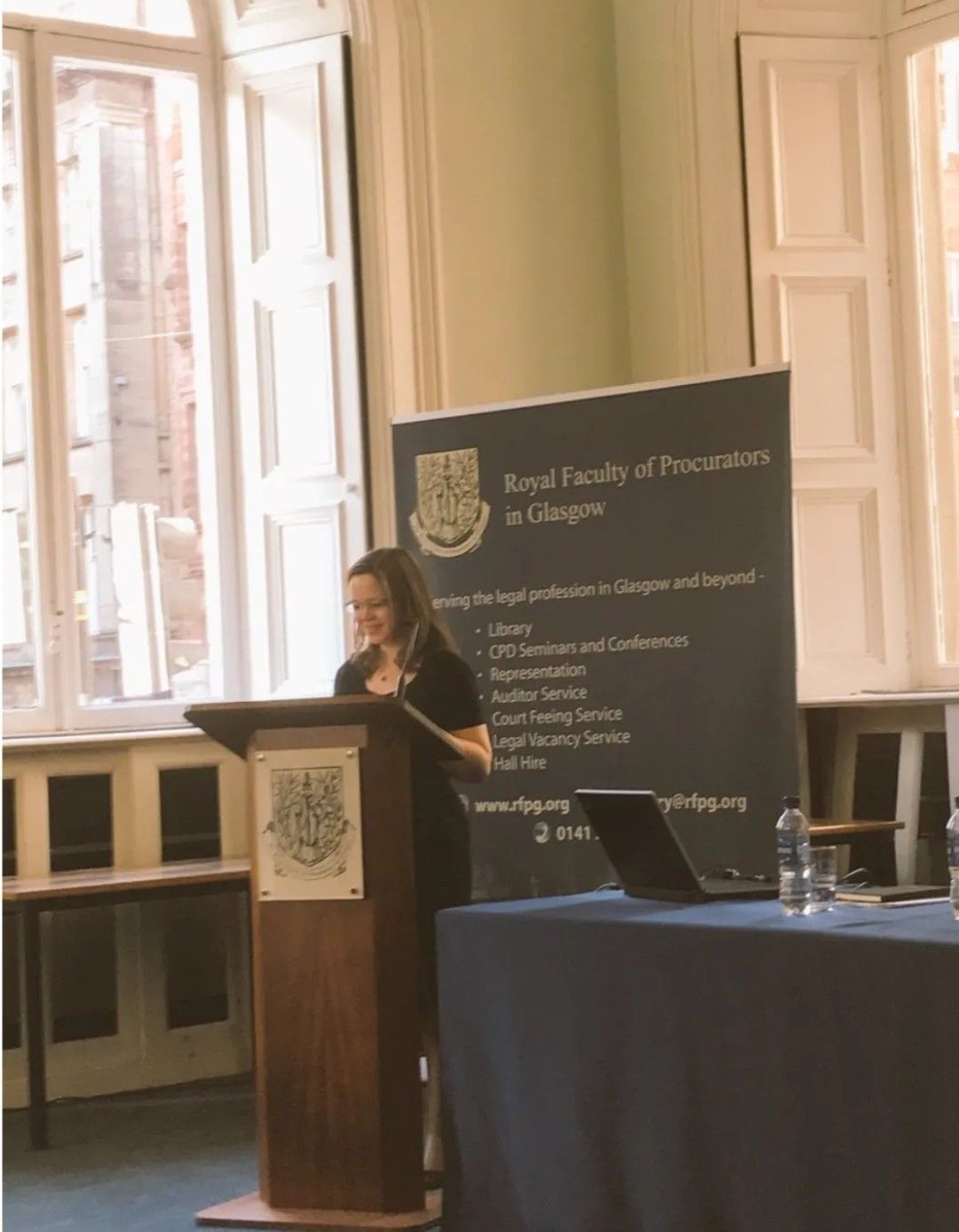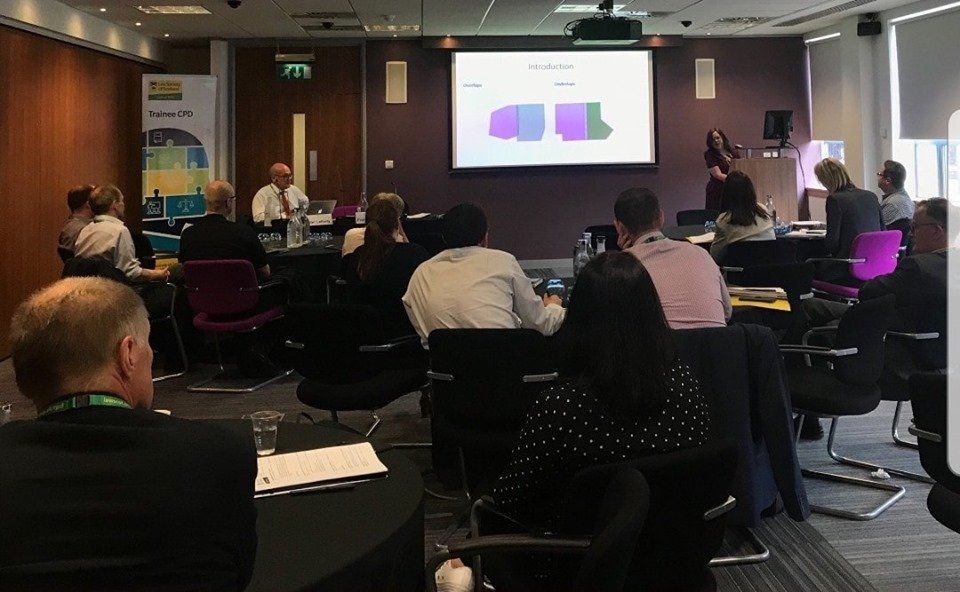Internal training for your law firm& external CPD events

Tailored CPD programme for your law firm
We can take the pain out of CPD planning for the year. We will work with you to create a short, medium or long term training plan for your firm and deliver regular sessions at a length and time that suits you.
Whether it's a lunchtime hour long session each week, a intensive two day property law crash course for new fee earners, or a three hour focused seminar each month, we have a programme to suit and can tailor it to your needs.
We do not charge per delegate, just a fixed fee per session or as a longer term package of regular sessions, so your firm can make financial savings against paying for training per fee earner, while having it tailored to your own needs. Smaller firms can band together locally and share the cost of sessions.
We can use your own internal styles, searches and title deeds as examples in any training we give you in-house to make it most relevant for your staff. We encourage round table discussion and Q&As and will follow up afterwards where necessary.
All internal CPD sessions come with Powerpoint slides for all attendees. Full written notes, style reviews, and other assistance can be offered as part of a bigger package.

3hr/6hr Masterclasses for your firm or faculty
Lexares ran a successful series of full day masterclasses at the end of the 2023 CPD year, and are now offering the same to firms and/or regional faculties all over Scotland.
These can be held as full day sessions, half day sessions or broken up into smaller bite size sessions over a period of time.
Each session is suitable for all levels of fee earner, with a robust overview of the issues to provide context for newly qualified staff but suffcient legal nuance and detail to keep associates and partners engaged.
Venue
We can hold these in the offices, faculty or local hotel of your choice - give us a call and we will work with you to make it readily accessible for you.
Speaker
Our founding member, Frances Rooney, will be hosting and speaking at these sessions.
Cost
We can either run these on a per person cost, or per firm cost, depending on what works out best for you and other attendees.
Per person costs would be:
- A half-day session (3 hours) costs £140 + VAT.
- A full day masterclass (6 hours) costs £200 + VAT.
This means you can get your CPD for as little as £33 per hour!
For larger firms/groups, we can offer the same for a fixed fee of £1500 + VAT per three hours. We can apply the same price to groups of firms joining together e.g. as local faculties, or two or three firms grouping together for a joint CPD event.
Payment is made by BACS following invoice to your firm - book by clicking the button at the bottom of this page or by directly emailing cpd@lexares.co.uk
-------------------------------------------------------------
6 hours CPD + breaks
PROPERTY LAW MASTERCLASS: MINE, YOURS OR OURS?
EXCLUSIVE VS COMMON RIGHTS
Morning: It’s mine, all mine!
1. The red line on the plan – An examination of common law and statutory presumptions and rules around ownership of boundary features such as roads, walls, water features etc; and a discussion of mapping requirements and the limitations of plans.
2. Is possession nine-tenths of the law? – Considering the legal interaction between title and possession for Sasine, 1979 Act registered titles and 2012 Act registered titles; reviewing the law on what does and does not equate to sufficient possession; and considering best practice and risk management including a discussion of the standard clauses in Missives and Dispositions relating to possession and potential revisals.
3. A non domino – Understanding the law pre and post 2012 Act on when bare possession without title allows people to acquire ownership, the difference between intentional and unintentional a non domino deeds, identifying potential a non domino issues in existing titles, the procedure for registering a new a non domino deed, alternative options.
Afternoon: What’s mine is yours, what’s yours is mine…
4. Common property - common law rules on ownership and use of common areas, march walls, PMP case and ramifications, land reg shared plots etc.
5. Common schemes – evolution of common schemes in the law, the interaction of ss53 and 53 of the TC(S)A, the requirements for proving a common scheme, the practical difficulty in reporting to clients as to whether a burden is still valid and pragmatic solutions, and ongoing proposed reforms to the law.
6. Creating multi-party title conditions - exploring the myriad of ways to create and interpret title conditions benefiting and burdening multiple parties, including tripartite or back to back Deed of Burdens, Deed of Conditions, Development Management Scheme, Tenement Management Scheme, and Community Burdens, with reference both to statutory and underlying common law.
-------------------------------------------------------------
6hrs CPD + breaks
LAND REGISTRATION MASTERCLASS
Morning: Lifting the veil behind the Register
1. Land Registration overview – background to 1979 v 2012; triggers for registration; general process for registration; liability to/from the Keeper
2. Reliance on the Land Register (“the mud”) – an examination of the extent to which we can rely on the Register as being the full story and when we need to look behind it to the underlying deeds; including consideration of the legal and practical effect of the Register via Midas Touch, realignment and prescription rules
3. Boilerplate Land Registration clauses – running through the boilerplate land registration clauses in Missives and Dispositions, a comparison between the standard styles (PSG, Standard Clauses etc), and what potential revisals may be made during negotiation
Afternoon: when things go wrong
4. Rejections – why RoS reject and when they have to; how to deal with rejections; looking at rejection trends and how they can be applied in your firm to avoid rejections
5. Rectification of the Register – when this may be wanted, the circumstances in which it is available, how to make a good request for rectification, and the risks and options if the Keeper will not rectify the Register
6. Financial claims (“the money”) – taking a legal and practical look at what happens when things go wrong; what the main options are for financial claims e.g. deed warrandice, Keeper warranty, etc and what is not covered by them

Some of our CPD topics
We are flexible and can cater to your requirements, whether that be an intense week of training up new staff members, a one-off session on something of particular importance to you, or a more regular arrangement.
To meet demand we now also offer packages of 3, 6, 9 and 12 one-hour sessions for your team, spread out over the months or year to suit you. These packages come with free monthly property law newsletters that you can circulate internally to keep your team up-to-date with developments. If you book one of these packages, we also give you a discount on any ad hoc additional sessions run for you in the same year.
We will agree a topic list with you in advance and will include some bespoke sessions if you want.
We can cater sessions to aim them at all levels, or for specifically junior staff or senior staff, and tailor the content appropriately.
As a starter for ten, some one-hour sessions we can roll out for you include:
1. Transactions (introductory level)
1.1. Transaction from start to finish – going through a basic purchase / sale transaction from initial instruction to registration, to give an overview understanding of why you are doing what you are doing and where it all fits in
1.2. Daily risk management – why and when to use checklists, file notes, etc to maximise efficiency and lower risk; suggestions for noting title and inventories and using that for later drafts like dispositions; and going through either PSG checklists and/or your own firm’s as examples (can tailor this session to you)
2. Title Examination & Title Issues
2.1. Sasine exam intro – dealing with the box of titles; inventorising; filling in gaps in documentation; searches; etc
2.2. Sasine deeds – types of deeds; structure of deeds; usual clauses; ex facie validity; warrandice
2.3. Title extent – types of description; legal presumptions on ground features, water rights etc; plans
2.4. Common property – common law rules on ownership and use of common areas, march walls, PMP case and ramifications, land reg shared plots etc
2.5. Title conditions intro – types of title condition, reform over the years, general context; creating and reading them
2.6. Creating title conditions – general context and legislative reform, identifying and categorising type of title condition, how to validly create them
2.7. Validity of existing title conditions – when they can be challenged, and how to do so
3. Land Registration
3.1. Introduction – background to 1979 v 2012; triggers for registration; general process for registration; liability to/from the Keeper
3.2. Content of a title sheet – sections of a title sheet; the cadastral map; subordinate plans (1979); shared plots; caveats; application record; archive record; extracts
3.3. Reliance on the Land Register (“the mud”) – Midas Touch; realignment; prescription etc
3.4. Financial claims (“the money”) – taking a legal and practical look at what happens when things go wrong; what the main options are for financial claims e.g. deed warrandice, Keeper warranty, etc
3.5. Registration without an underlying deed – voluntary registration, automatic plot registration, keeper induced registration – when each one happens, the processes, when to use them to your advantage, the red flags and risks
3.6. A non domino / s43 prescriptive claimants – understanding the law pre and post 2012 Act on when possession without title allows people to acquire ownership, the difference between intentional and unintentional a non domino deeds, identifying potential a non domino issues in existing titles, the procedure for registering a new a non domino deed, alternative options
3.7. Boilerplate clauses in Missives and Dispositions – why we have them, what the different “standard” styles (PSG, Standard Clauses etc) say, and how to negotiate them (can incorporate your style/comments)
3.8. Rectification of the Register – why you may want to, the circumstances in which it is available, how to make a good request for rectification
3.9. Rejections – why RoS reject and when they have to; how to deal with rejections; looking at rejection trends and how they can be applied in your firm to avoid rejections
4. Case Law Updates
These sessions can tie in with the newsletters but with more detail and enabling discussion on the points raised by them. They can be one-off sessions or regular, depending on your needs. We can either work with you beforehand to identify areas that are of particular importance to you, or just select some cases that we think are interesting – the choice is yours.
4.1. A selection of property case law over the last month / quarter / year - the smaller the time period examined, the more in-depth a dive into each case discussed
4.2. Case law on a specific topic – either something fairly wide like land registration (high level look at the cases) or more of a deep examination of narrower issues e.g. case law around common area registrations

Frances Rooney regularly presents at CPD events on matters such as title examination, land registration and other property law and conveyancing issues.
Additionally we regularly partner with CCPD Training to provide three-hour sessions on such topics as land registration or title examination. See further http://ccpdtraining.co.uk/seminars
